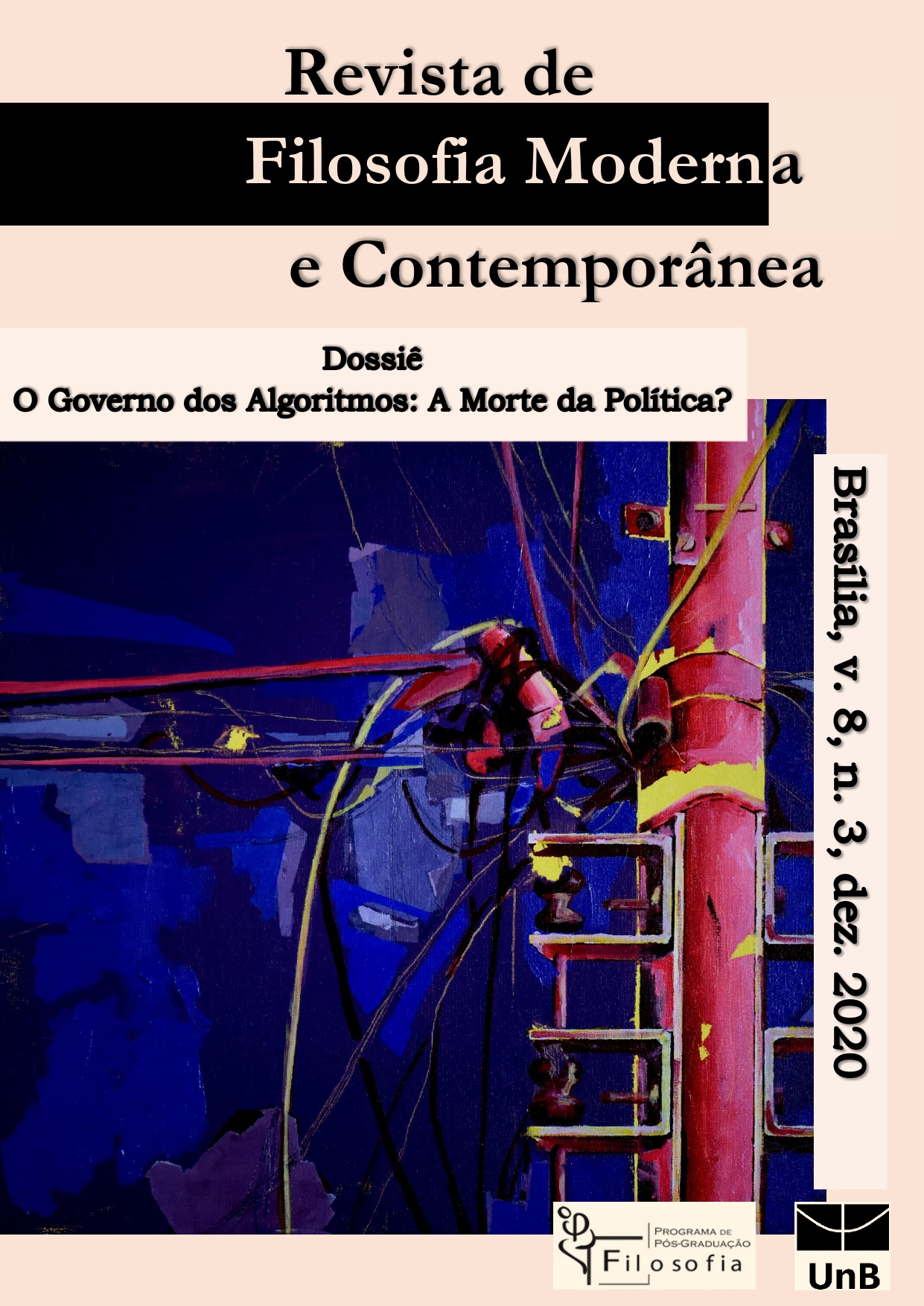Zero-Order Privacy Violations and Automated Decision-Making about Individuals
DOI:
https://doi.org/10.26512/rfmc.v8i3.34503Keywords:
Zero-Order Privacy Violations. Privacy. Artificial Agents. Data. Information.Abstract
In this article, it is presented the notion of zero-order privacy violation as a grounding practice within a new type of human exploitation, namely, data colonialism: massive appropriation of social life through data extraction, acquiring digital “territory” and resources from which economic value can be extracted by capital (Couldry & Mejias, 2019). At first, I claim that privacy violations do not depend on the nature of the agents involved. Robots read your email, and not having humans involved in the process does not make it less of a violation. It is considered that the harvested data stream is better understood as being a commodity when clean, well-formed, meaningful data standards are respected. Then, it is suggested that scenarios like the covid-19 pandemic make a perfect case to expand surveillance via tracking applications. Companies and governments with pre-existing tendencies to secrecy, tech-enabled authoritarianism, and austerity, capitalize on disinformation strategies. Finally, remarks on the value of encryption, and strategic deleting as measures to reinforce privacy are made.
Downloads
References
Austin, L. (2003). “Privacy and the Question of Technology”. Law and Philosophy 22:119-166.
Cohen, Julie E. 2018. “The Biopolitical Public Domain: The Legal Construction of the Surveillance Economy.” Philosophy & Technology. 31 (2): 213”“33.
Couldry, N.; Meijas, U. (2019). The Costs of Connection: How data is colonizing human life and appropriating it for capitalism. Stanford University Press.
Caliskan, Aylin; Bryson, Joanna J.; Narayanan, Arvind. (2017). “Semantics derived automatically from language corpora contain human-like biases”. Science. 356 (6334): 183”“186. arXiv:1608.07187.
Dowrk, C.; Roth, A. (2014). “The Algorithmic Foundations of Differential Privacy”. Nos. Vol. 09 3-4:211-417.
Etzioni, A. (2014). “A Cyber Age Privacy Doctrine: A Liberal Communitarian Approach”. I/S Journal of Law and Policy for the Information Society, 10 (2):641-669.
De Rizzo, J. (2020). “Grounding grounds necessity”. Analysis. anz083.
Fine, K. (2012). Guide to ground. In Metaphysical Grounding: Understanding the Structure of Reality, eds. F. Correia and B. Schnieder, 37”“80. Cambridge: Cambridge University Press.
Fine, K. 2017. A theory of truthmaker content I: conjunction, disjunction and negation.
Journal of Philosophical Logic 46: 625”“74.
Floridi, L. (2004). “Outline of a Theory of Strongly Semantic Information”. Minds and Machines 14: 197.
Floridi, L. (2014). The 4th Revolution: How Infosphere is Reshaping Human Reality. Oxford University Press.
Frey, S. (2018, July 3). Ensuring your security and privacy within Gmail [blog post]. Retrieved from https://www.blog.google/technology/safety-security/ensuring-your-security-and-privacy-within-gmail.
Jackson, Matthew O.; Morelli, Massimo (2011). "The Reasons for Wars ”“ an Updated Survey". In Coyne, Chris J.; Mathers, Rachel L. (eds.). The Handbook on the Political Economy of War. Edward Elgar Publishing.
Kleinman, Z. (2018, March 20). Cambridge Analytica: The data firm's global influence. Retrieved from https://www.bbc.com/news/world-43476762.
Lessig, L. (2006). Code: version 2.0, Basic Books, New York.
Liu et al. (2020). “Evolving Normalization-Activation Layers”, Machine Learning, arXiv:2004.02967 [cs.LG].
Parrales et al. (2016). “DNAJA1 controls the fate of misfolded mutant p53 through the mevalonate pathway”. Nature Cell Biology, 18 (11): 1233.
Pyysalo et al. 2020. “WikiBERT models: deep transfer learning for many languages”. Computation and Language, arXiv:2006.01538 [cs.CL].
Snowden. E. (2015). Just days left to kill mass surveillance under Section 215 of the Patriot Act. We are Edward Snowden and the ACLU's Jameel Jaffer. AUA. ”¢ /r/IAmA”. Reddit. Retrieved at https://www.reddit.com/r/IAmA/comments/36ru89/just_days_left_to_kill_mass_surveillance_under
Vedula et al. (2020). “Automatic Discovery of Novel Intents & Domains from Text Utterances”. Computation and Language, arXiv:2006.01208 [cs.CL].
Warren & Brandeis. (1890). “The Right To Privacy”. Harvard Law Review. Vol. IV, 5.
Westin, A. (1968). Privacy and Freedom (Fifth ed.). Atheneum, New York.
https://en.wikipedia.org/wiki/Olmstead_v._United_States Retrieved 12-07-2020.
Downloads
Published
Issue
Section
License
Copyright (c) 2021 Journal of Modern and Contemporary Philosophy

This work is licensed under a Creative Commons Attribution-NonCommercial-NoDerivatives 4.0 International License.
Copyright for articles published in this journal is retained by the authors, with first publication rights granted to the journal. By virtue of their appearance in this open access journal, articles are free to use, with proper attribution, in educational and other non-commercial settings.


